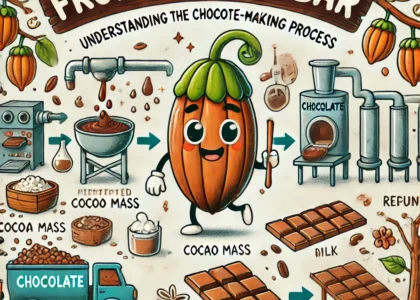Introduction
Chocolate is often considered a go-to comfort food, especially during stressful or emotional times. But beyond its delightful taste, emerging research suggests that chocolate—particularly dark chocolate—may have measurable benefits for mental health and cognitive function. From mood enhancement to reducing symptoms of anxiety and depression, cocoa’s bioactive compounds interact with brain chemistry in fascinating ways.
This article explores the scientific evidence linking chocolate consumption with mental well-being, the mechanisms involved, and practical considerations for enjoying chocolate as part of a healthy lifestyle.
1. Nutritional Profile of Chocolate Relevant to Mental Health
Dark chocolate contains several nutrients and compounds that support brain health:
- Flavanols: Potent antioxidants that improve blood flow to the brain.
- Magnesium: A mineral involved in nerve transmission and mood regulation.
- Tryptophan: An amino acid precursor to serotonin.
- Theobromine and caffeine: Mild stimulants that can improve alertness and mood.
- Phenylethylamine (PEA): Often called the “love chemical,” it can elevate mood.
2. Chocolate and Mood Enhancement
Multiple studies have shown that chocolate can have positive effects on mood:
- Consumption of flavanol-rich chocolate is linked to improved cognitive function and memory.
- Chocolate stimulates the release of dopamine and endorphins, neurotransmitters associated with pleasure.
- The presence of PEA may mimic some effects of antidepressants by boosting serotonin levels.
A randomized controlled trial published in Nutrients (2019) found that participants consuming dark chocolate experienced reductions in anxiety and improved mood compared to a placebo group.
3. Stress Reduction and Cortisol
Stress increases cortisol, the body’s primary stress hormone. Some research suggests that eating moderate amounts of dark chocolate can reduce cortisol levels and promote relaxation.
- A 2013 study showed that daily consumption of high-flavanol dark chocolate reduced cortisol and perceived stress in healthy adults.
- This effect may be related to the antioxidants and bioactive compounds in chocolate that modulate the hypothalamic-pituitary-adrenal (HPA) axis.
4. Cognitive Function and Neuroprotection
Flavanols in chocolate have been shown to enhance cognitive performance by:
- Improving cerebral blood flow, which increases oxygen and nutrient delivery to the brain.
- Promoting neurogenesis and protecting neurons from oxidative stress.
- Enhancing attention, memory, and executive function in older adults.
These effects suggest a potential role for chocolate in preventing cognitive decline and supporting healthy aging.
5. Chocolate and Depression: What Does the Research Say?
While chocolate is often craved by those experiencing depression, the relationship is complex:
- Some observational studies show an association between chocolate consumption and reduced depressive symptoms.
- However, chocolate should not replace clinical treatments for depression.
- The mood-enhancing properties may provide short-term relief but are not a substitute for therapy or medication.
More rigorous clinical trials are needed to clarify chocolate’s role in managing depression.
6. Practical Considerations and Recommendations
To maximize mental health benefits while avoiding negative effects, consider:
- Choosing dark chocolate with at least 70% cocoa for higher flavanol content.
- Consuming moderate amounts (about 20–30 grams per day) to balance benefits and calories.
- Avoiding chocolates high in sugar and unhealthy fats, which can have adverse health impacts.
- Incorporating chocolate as part of a balanced diet rich in fruits, vegetables, and whole grains.
Conclusion
Chocolate’s rich composition of bioactive compounds offers promising benefits for mental health, including mood improvement, stress reduction, and cognitive support. While it is not a cure-all, moderate consumption of high-quality dark chocolate can be a pleasurable and potentially beneficial addition to a mental wellness strategy.
As science continues to uncover the nuances of cocoa’s effects on the brain, chocolate remains a delicious bridge between indulgence and well-being.
References
- https://www.ncbi.nlm.nih.gov/pmc/articles/PMC6769765/
- https://www.frontiersin.org/articles/10.3389/fnut.2019.00128/full
- https://www.healthline.com/nutrition/chocolate-and-mental-health
- https://www.sciencedirect.com/science/article/abs/pii/S0197458018305250
- https://www.ncbi.nlm.nih.gov/pmc/articles/PMC5609573/






